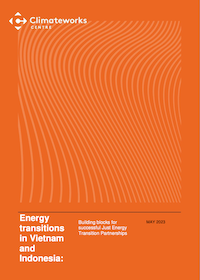
Southeast Asia is a fast-growing region with significant opportunities to accelerate decarbonization.
The recently announced Just Energy Transition Partnerships (JETP) in Indonesia and Viet Nam demonstrate strengthened commitment to accelerate the low-carbon transition in the region by developing a country-led model that aims to phase out coal-fired power generation and cease building of new ones, while ensuring equitable and inclusive outcomes for vulnerable workers and communities in coal-dependent regions, as well as consumers and incumbent companies.
While JETP is not designed to facilitate the wholesale transition, the initial success of its implementation is important to accelerate the momentum for the energy transition, while enabling further financial flows into the two countries and strengthen the governance of climate action.
Against this backdrop, Climateworks Centre has been working on designing a holistic framework to demonstrate a model implementation plan for JETP, informed by academic and gray literature on the policy implications from the global North and the global South. Climateworks Centre aims to initiate a discussion on the enablers and barriers to JETP's successful implementation.
This policy brief provides an interdisciplinary perspective for policymakers, financial institutions and societal actors who are aiming to contribute to the successful implementation of JETP.
Contents
- Introduction
- Overview
- Why is a just transition essential?
- What do the just energy transition commitments of Indonesia and Viet Nam mean?
- Building blocks for a successful just energy transition mechanism
- Assessing the potential of Just Energy Transition Partnerships
- Conclusion
- References
Published May 2023.
Source: Climateworks Centre
Download (1 MB)

